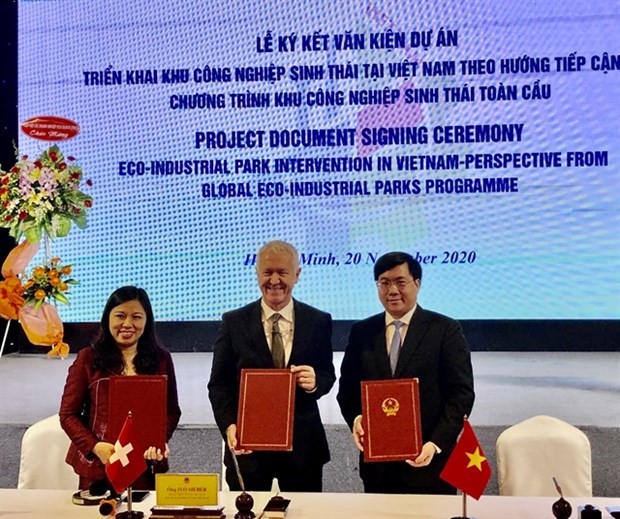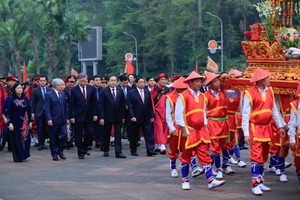
The inception workshop and signing ceremony of the project were held in Ho Chi Minh City last week.
The project has a cost of more than US$1.82 million, of which US$1.68 million is official development assistance (ODA) from the Government of Switzerland through its Swiss State Secretariat for Economic Affairs, as well as co-funding of US$138,800 from the Ministry of Planning and Investment.
It is the continuation of the successful implementation of the pilot initiative which concluded last year after being launched in 2014.
The three-year project will be implemented in the cities of Hanoi, Hai Phong, Da Nang, Can Tho and HCM City, and Dong Nai province.
It is expected to create the foundation for the replication of the eco-industrial park (EIP) model across the country in the coming years.
The project has two components: enhancing policies and instructions for the implementation of EIPs, and implementing technical interventions to transform selected industrial parks into EIPs.
It will help improve the legal framework and develop information and technical databases to connect businesses and to support implementation of solutions to transform industrial parks into EIPs.
It is expected that the outcomes of the project will lay the foundation for Government agencies and donors to continue mainstreaming the EIP concept throughout the country.
Speaking at the inception workshop, Swiss Ambassador to Vietnam Ivo Sieber said that Vietnam’s development over the past 30 years had been truly remarkable. However, rapid economic growth and industrialisation had had a detrimental impact on the environment and natural assets.
There had been a sharp increase in Green House Gas emissions (GHG) and a growing depletion of biodiversity over the same period of time, he said.
“It is encouraging that Vietnam’s next Socio-Economic Development Strategy 2021-2030 includes clear strategic directions, which will promote a transformation towards a green economy.
“The viability and benefits of an eco-industrial park model will contribute to improving the economic, environmental and social performance of industries in Vietnam, which is very responsive to the government’s vision of a green economy.”
"Switzerland is proud to partner with UNIDO in promoting resource efficiency and cleaner production solutions in Vietnam," he added.
Le Thi Thanh Thao, UNIDO’s country representative in Vietnam, said that the EIP model was essential for Vietnam to develop sustainable industrial development, while protecting the environment through resource and energy-use efficiency.
EIPs would be more likely to attract investments and generate a collective competitive advantage, Thao said.
The development of EIPs would create a premise to improve policies and regulations about EIPs in particular and to integrate the EIP model into the legal framework on the environment and industries as well as other relevant policies, she added.
The Ministry of Planning and Investment and UNIDO, with the support of a number of donors, implemented the eco-industrial park initiative in the 2014 – 2019 period. It had significant impact on policy development and demonstrated innovative technologies and practices.
The EIP model is mentioned in Decree 82 on the management of industrial zones and economic zones. The new decree forms a strong legal framework for the future development of Eco-Industrial Parks in Vietnam.
Various solutions for resource-efficient and cleaner production were implemented under the framework of the pilot initiative.
These led to an avoided annual demand of over 22,000 MWh of electricity, 600,000 cubic metres of freshwater, 140 TJ of fossil fuel, and nearly 3,600 tonnes of chemicals and waste, through resource-efficient and cleaner production and industrial symbiosis solutions.
These solutions also led to avoided emissions of 32 kt of CO2 every year.
As of the end of June, the country had 336 industrial parks, of which 279 are operational.
Last year, enterprises in IPs and economic zones earned US$235 billion in revenue, a year-on-year increase of 8 percent, and US$142 billion in export turnover, contributing nearly 59 percent to the nation's export turnover.
























